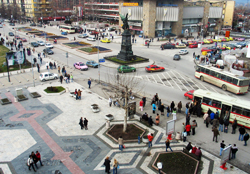
Media scene in Krusevac
Impoverished and fighting for survival

When the time comes to fight for bare survival, the first casualties are the principles of responsible and engaged journalism. Worsened economic environment and political interference with everyone's affairs have resulted in diminished enthusiasm and self-confidence, leading to compromises and self-censorship. All these symptoms are noticeable in the media scene in Krusevac.
At the moment, around 150 citizens of Krusevac work in the media field, while around 100 of them have lost their jobs so far during the last year due to workforce reduction or closure of their media outlets. More than a third – mostly those employed in private media outlets – receive only minimal and irregular salaries, without any health insurance, while those who depend on the local government's budget earn around 25,000 dinars on average and are employed by the Regional Radio and TV Krusevac. Thanks to the willingness of the local administration to preserve "their" public service broadcaster, this media outlet has avoided the attempts to privatize it. However, its management claims that even with the budget support in the amount of around 30 million dinars – comprising 40% of the needed funds – it is barely possible to cover the operating expenses. Apart from the obvious interference of the founder with its editorial policy, the station has great difficulties in attempting to eliminate self-censorship among the hundred employees who have largely been hired thanks to their political connections.
Regarding the private media outlets, they have for a long time been fighting to survive in an environment with a diminishing number of local advertisers, while those who have managed to weather the crisis pay their utmost attention to advertising. The few companies that have remained in the market after successful privatizations have moved their marketing departments to Belgrade and their marketing campaigns to national media outlets. Only the public sector has some money left, but this money entails divergence from critical journalism.
After the "cleanup" of the media scene, broadcasting licenses in Krusevac have been issued to three local TV stations, one regional radio and TV broadcaster, and three local radio stations. In the meantime, TV Lastavica closed its operations because of large debt owed to the Republic Broadcasting Agency. TV Jefimija, friendly disposed toward the government headed by the Democratic Party, has avoided such fate and managed to pay back its debts due to support from the local government's budget. However, the station's employees earn only 10,000-15,000 dinars a month. TV Plus, whose owner is the leader of the local branch of the Serbian Progressive Party, has laid off 30 employees and transferred the remaining ten to a newly formed agency in order to avoid paying piled-up debts. Average salaries amount to 15,000 dinars a month and are usually two months late, while pension contributions have not been paid for six months.
Two local print media outlets have found themselves in the most difficult financial position. Weekly "Pobeda" was unsuccessfully privatized by a Bulgarian company, "Media Svyat" and since March has been under the state's tutorship, which is expected to pay the missing pension contributions for the last year and assist in its survival together with the local government. The weekly's employees, who have not been paid for nine months, have recently signed an annex to a collective contract agreeing to minimum wages. Salaries have also been several months late in the private weekly magazine "Grad" which was founded in 2002. This situation in print media is caused by the fact that advertisers prefer electronic media, and by the attitude of the local self-government that has only recently decided – after an initiative by the Independent Journalists' Association of Serbia and the Local Press – to allocate to local newspapers a small portion of the budget item earmarked for the media.
Nada Budimovic
MC Newsletter, July 30, 2010
View all comments (0) Leave a comment
Published comments contain opinions that are not the opinions of Media Center. Responsibility for the content of messages and their accuracy lies on the website users who posted them.



